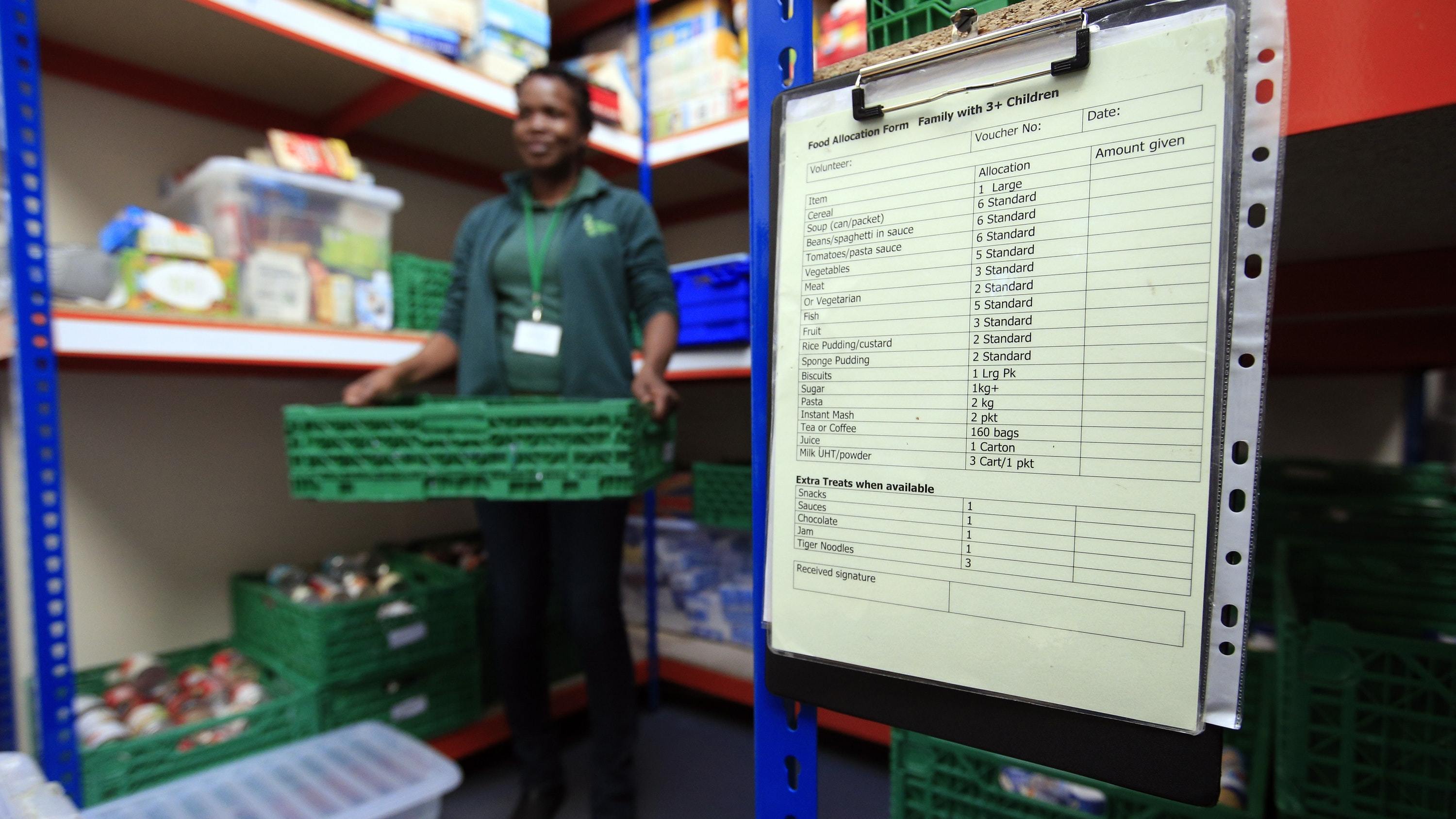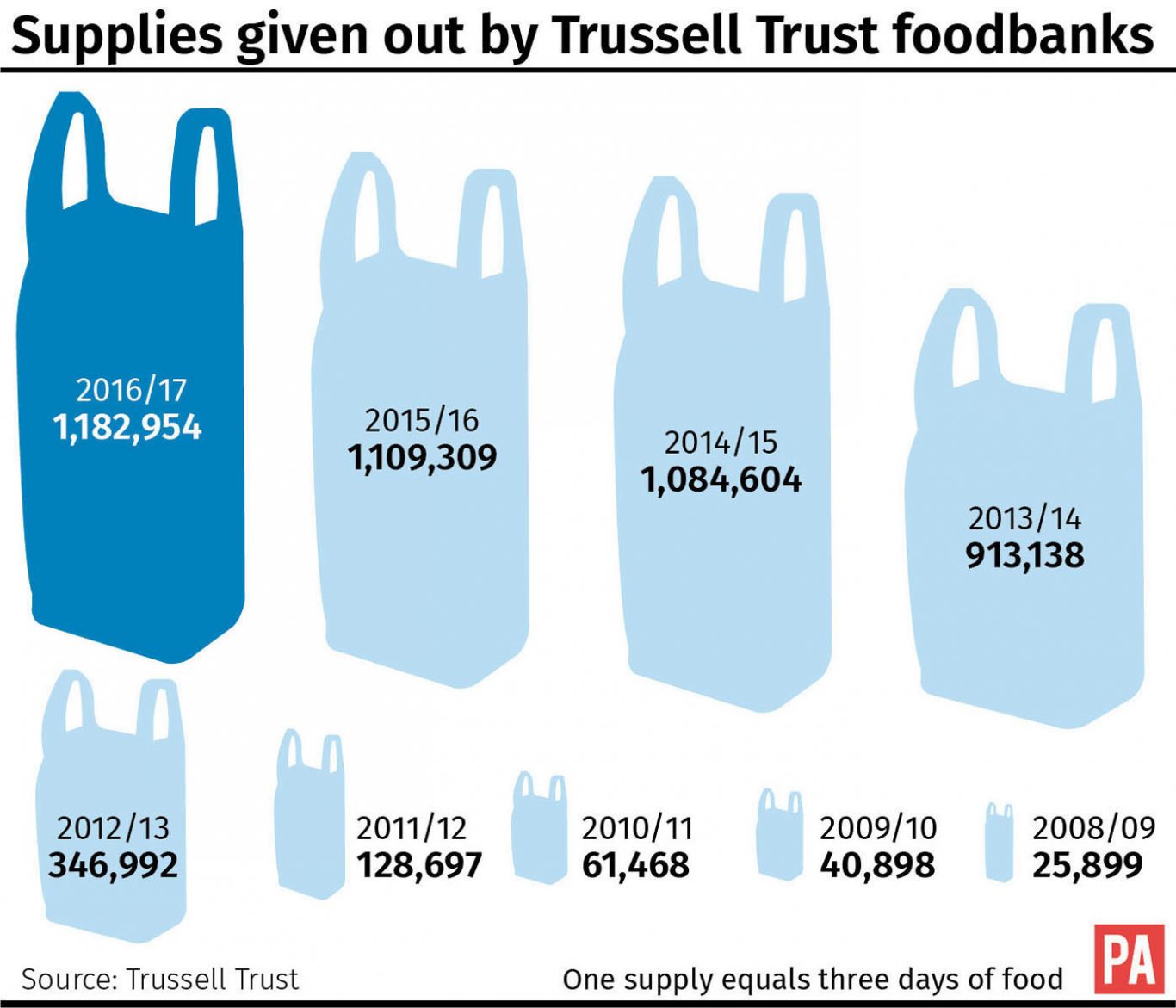
FOUR out of five people referred to foodbanks have skipped meals and gone without eating, sometimes for days at a time, a major new study has revealed.
Research commissioned by the Trussell Trust showed that half of people using foodbanks said their incomes were “unsteady” from week to week.
In the biggest study of its kind, most of the 400 households questioned said they had been hit by a recent “income shock” such as increases in housing or food costs.
Unparalleled detail in new @UniofOxford #foodbank research. Food insecurity levels just 1 of many worrying findings> https://t.co/cWq6xhKrsT pic.twitter.com/TzhLJXcvou
— The Trussell Trust (@TrussellTrust) June 29, 2017
Around four out of five of those questioned by researchers from Oxford University said they had skipped meals and gone without eating in the past year.
Half said they could not afford heating or toiletries. A similar number of households included a disabled person.
Many of those referred to one of the Trussell Trust’s 420 foodbanks were waiting for a benefit payment.
David McAuley, chief executive of the Trussell Trust, said: “Last year, Trussell Trust foodbank volunteers provided 1.2 million emergency food supplies to people in crisis.
Today's @UniofOxford #foodbank research confirms without a doubt poverty & hunger in the UK are real > https://t.co/XcgxrXFmP7 #StopUKHunger pic.twitter.com/nVFm6jovWc
— The Trussell Trust (@TrussellTrust) June 29, 2017
“This pioneering research confirms to us what those volunteers have been telling us.
“Every day they are meeting people trying to cope with low, insecure incomes and rising prices that mean even the smallest unexpected expense can leave them destitute and hungry, be that an unexpected bill, bereavement or the loss of income caused by benefit delay.
“Particularly concerning are the very high numbers of disabled people or people with mental health problems needing foodbanks.
“These findings reaffirm how vital the work of foodbanks and generosity of donors is, but are also a clear challenge to the new Government to do more to stop people ending up in crisis in the first place.”
Deeply concerning to see @UniofOxford research confirm that food is not the only essential people at #foodbanks cannot afford #StopUKHunger pic.twitter.com/SJtaSDC4tk
— The Trussell Trust (@TrussellTrust) June 29, 2017
Dr Rachel Loopstra, Associate Member of the Department of Sociology, University of Oxford, who was lead author of the report, said: “The stories emerging from foodbanks across the country have surprised and shocked many people but until now, we have not been able to put them in a numerical context.
“Our survey data shows how people using foodbanks are unable to ensure they always have enough food to eat because their incomes are too low and too insecure.
“We observed how commonly income or expenditure shocks, whether arising from a delay in receiving a benefit payment, from a benefit sanction, or from rising energy costs, tipped households into food bank use.
“These shocks, and resulting foodbank usage, occur among people who live with extremely low incomes and chronic food insecurity, where meeting basic needs is an ongoing struggle.”

A Government spokesman said: “We’re helping millions of households meet the everyday cost of living and keep more of what they earn while also spending over £90 billion a year in extra support for those who need it.
“Employment is the best route out of poverty and, with record numbers of people – including disabled people – now in work, we’ve made great progress.
“But we want to go even further to help ordinary families.”

Enjoy the convenience of having The Sunday Post delivered as a digital ePaper straight to your smartphone, tablet or computer.
Subscribe for only £5.49 a month and enjoy all the benefits of the printed paper as a digital replica.
Subscribe